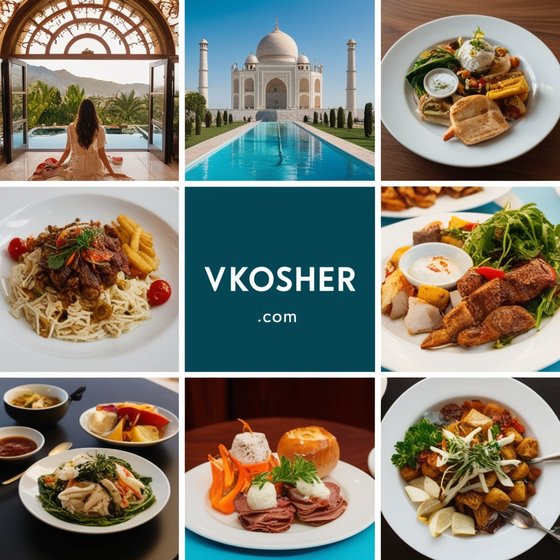Understanding Kosher Food During Passover
Passover, or Pesach, is one of the most significant Jewish holidays, commemorating the liberation of the Israelites from Egyptian bondage. Observed for eight days in most traditions, it is a time steeped in religious and cultural practices that include dietary restrictions aimed at reinforcing the historical and spiritual themes of the holiday. Central to these practices is the consumption of kosher food, which adheres to the specific guidelines set out in Jewish dietary laws, or kashrut, and is especially significant during Passover.
The Basics of Kosher Food
Kosher food refers to food that complies with the dietary laws outlined in the Torah, the central reference of the religious Judaic tradition. The concept of kashrut involves various rules about how food should be prepared, what ingredients are permissible, and how different types of food are handled. For a food item to be considered kosher, it must be free from non-kosher ingredients and processed using equipment that has been deemed kosher.
Passover-Specific Guidelines
During Passover, these dietary laws are further refined to reflect the themes of the holiday. One of the most notable changes is the prohibition of chametz, which refers to leavened bread and other products made from wheat, barley, rye, oats, or spelt that have leavened or risen. The prohibition of chametz serves as a reminder of the haste with which the Israelites fled Egypt, not having time to let their bread rise.
The Role of Matzah
In place of chametz, matzah, an unleavened bread, becomes a staple of Passover meals. Matzah is made from flour and water and baked quickly to prevent any leavening. It is a symbol of the Israelites' hasty departure from Egypt and serves as a key component of the Passover Seder, a ritual meal that marks the beginning of the holiday. The Seder plate includes a piece of matzah alongside other symbolic foods, each representing different aspects of the Passover story.
Passover Food Preparation and Kitchen Practices
Preparing kosher food for Passover involves more than just avoiding chametz. The preparation process requires thorough cleaning of kitchen utensils and appliances to remove any traces of chametz. This includes not only cleaning but often also koshering, which is a specific process of purging utensils and equipment of chametz through various means such as boiling or heating. This meticulous cleaning process ensures that no remnants of chametz remain in the kitchen or on cooking equipment.
Special Passover Products
Due to the unique requirements of Passover, many specialized kosher products are available during this time. These products are certified kosher for Passover and include items such as matzah meal, which is used as a substitute for flour in recipes, and a variety of kosher-for-Passover snacks and meals. Food manufacturers and grocery stores often carry a range of these products to cater to the needs of those observing the holiday.
Passover and Dietary Restrictions
Individuals observing Passover must navigate their dietary restrictions carefully, particularly if they have additional dietary needs such as vegetarianism or food allergies. Many Passover-friendly recipes and products are designed to accommodate various dietary restrictions while maintaining adherence to kosher laws. This ensures that everyone can partake in the holiday’s celebrations without compromising their health or religious observance.
Culinary Traditions and Innovations
The culinary traditions of Passover are rich and diverse, reflecting the varied cultural backgrounds of Jewish communities around the world. Traditional dishes like gefilte fish, matzah ball soup, and brisket are commonly served, each with regional variations and personal touches. Modern innovations in Passover cuisine have introduced new recipes and adaptations that blend traditional flavors with contemporary cooking techniques. This evolution reflects the dynamic nature of Jewish culinary practices and the creativity of those who observe Passover.
The Spiritual Significance of Kosher Passover Food
The observance of kosher food practices during Passover extends beyond mere dietary laws. It embodies a deeper spiritual significance, serving as a tangible connection to Jewish heritage and the historical events commemorated by the holiday. By following these dietary rules, individuals reaffirm their commitment to their faith and heritage, and they create a meaningful and memorable experience for themselves and their families.
Conclusion
Kosher food during Passover is a fundamental aspect of the holiday, encompassing both historical significance and religious observance. The careful adherence to kashrut during this time highlights the importance of maintaining traditions and honoring the past. Through the preparation and consumption of kosher-for-Passover foods, individuals celebrate their identity, history, and faith, reinforcing the enduring legacy of Passover in Jewish culture and practice.
Passover, or Pesach, is one of the most significant Jewish holidays, commemorating the liberation of the Israelites from Egyptian bondage. Observed for eight days in most traditions, it is a time steeped in religious and cultural practices that include dietary restrictions aimed at reinforcing the historical and spiritual themes of the holiday. Central to these practices is the consumption of kosher food, which adheres to the specific guidelines set out in Jewish dietary laws, or kashrut, and is especially significant during Passover.
The Basics of Kosher Food
Kosher food refers to food that complies with the dietary laws outlined in the Torah, the central reference of the religious Judaic tradition. The concept of kashrut involves various rules about how food should be prepared, what ingredients are permissible, and how different types of food are handled. For a food item to be considered kosher, it must be free from non-kosher ingredients and processed using equipment that has been deemed kosher.
Passover-Specific Guidelines
During Passover, these dietary laws are further refined to reflect the themes of the holiday. One of the most notable changes is the prohibition of chametz, which refers to leavened bread and other products made from wheat, barley, rye, oats, or spelt that have leavened or risen. The prohibition of chametz serves as a reminder of the haste with which the Israelites fled Egypt, not having time to let their bread rise.
The Role of Matzah
In place of chametz, matzah, an unleavened bread, becomes a staple of Passover meals. Matzah is made from flour and water and baked quickly to prevent any leavening. It is a symbol of the Israelites' hasty departure from Egypt and serves as a key component of the Passover Seder, a ritual meal that marks the beginning of the holiday. The Seder plate includes a piece of matzah alongside other symbolic foods, each representing different aspects of the Passover story.
Passover Food Preparation and Kitchen Practices
Preparing kosher food for Passover involves more than just avoiding chametz. The preparation process requires thorough cleaning of kitchen utensils and appliances to remove any traces of chametz. This includes not only cleaning but often also koshering, which is a specific process of purging utensils and equipment of chametz through various means such as boiling or heating. This meticulous cleaning process ensures that no remnants of chametz remain in the kitchen or on cooking equipment.
Special Passover Products
Due to the unique requirements of Passover, many specialized kosher products are available during this time. These products are certified kosher for Passover and include items such as matzah meal, which is used as a substitute for flour in recipes, and a variety of kosher-for-Passover snacks and meals. Food manufacturers and grocery stores often carry a range of these products to cater to the needs of those observing the holiday.
Passover and Dietary Restrictions
Individuals observing Passover must navigate their dietary restrictions carefully, particularly if they have additional dietary needs such as vegetarianism or food allergies. Many Passover-friendly recipes and products are designed to accommodate various dietary restrictions while maintaining adherence to kosher laws. This ensures that everyone can partake in the holiday’s celebrations without compromising their health or religious observance.
Culinary Traditions and Innovations
The culinary traditions of Passover are rich and diverse, reflecting the varied cultural backgrounds of Jewish communities around the world. Traditional dishes like gefilte fish, matzah ball soup, and brisket are commonly served, each with regional variations and personal touches. Modern innovations in Passover cuisine have introduced new recipes and adaptations that blend traditional flavors with contemporary cooking techniques. This evolution reflects the dynamic nature of Jewish culinary practices and the creativity of those who observe Passover.
The Spiritual Significance of Kosher Passover Food
The observance of kosher food practices during Passover extends beyond mere dietary laws. It embodies a deeper spiritual significance, serving as a tangible connection to Jewish heritage and the historical events commemorated by the holiday. By following these dietary rules, individuals reaffirm their commitment to their faith and heritage, and they create a meaningful and memorable experience for themselves and their families.
Conclusion
Kosher food during Passover is a fundamental aspect of the holiday, encompassing both historical significance and religious observance. The careful adherence to kashrut during this time highlights the importance of maintaining traditions and honoring the past. Through the preparation and consumption of kosher-for-Passover foods, individuals celebrate their identity, history, and faith, reinforcing the enduring legacy of Passover in Jewish culture and practice.




